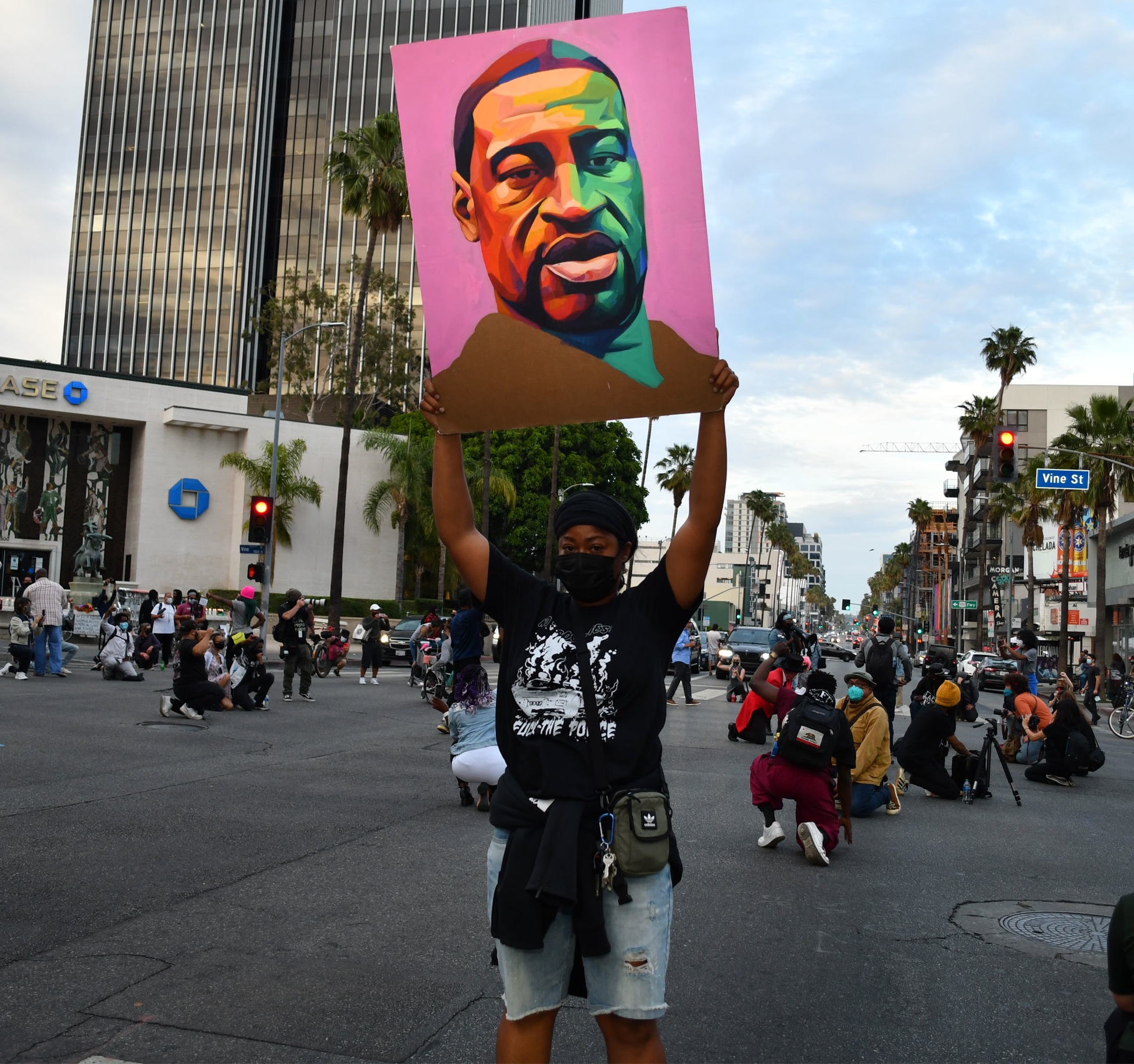One-year anniversary of George Floyd’s death marked by legislation and demonstrations
By Ray Richardson
Contributing Writer
LOS ANGELES — Activists rallied outside Los Angeles City Hall May 25 in observance of the one-year anniversary of the death of George Floyd in Minneapolis while inside City Hall the City Council was passing a resolution in support of the George Floyd Justice In Policing Act, a federal bill introduced in 2020 by U.S. Rep. Karen Bass.
The George Floyd Justice In Policing Act would make systematic reforms to policing in the United States by creating a national police misconduct registry to collect data on allegations for police departments nationwide, the City Council resolution said.
Bass, D-Los Angeles, issued a statement thanking the council for its backing.
“Many of my friends on the council remember the pain of not getting national reforms enacted after Rodney King was beaten 30 years ago,” she said. “I hope that acting this time on the heels of the torturous murder of George Floyd, we can enact real, substantive change to our policing system. Thank you again for acting in support of this important piece of legislation.”
Members of the City Council and the California Legislative Black Caucus also released unified statements on police reform as the state and nation paused to remember Floyd’s death.
Floyd was killed by former Minneapolis police officer Derek Chauvin on May 25, 2020 during an arrest over a payment dispute at a nearby store. Videos showed Chauvin kneeling on Floyd’s neck for nine minutes, 25 seconds before Floyd lost consciousness laying face down in handcuffs.
A Hennepin County jury convicted Chauvin on April 21 of second-degree and third-degree unintentional murder and second-degree manslaughter. Chauvin, facing a minimum of 40 years in prison, is expected to be sentenced in June.
“One year after the death of George Floyd, I, with other members, … will continue our work in the California Legislature to improve the lives of Black Californians,” said Assemblyman Kevin McCarty (D-Sacramento), secretary of the California Legislative Black Caucus. “We will never stay silent in the face of injustice.”
Floyd’s death sparked proposals for a federal bill in his name. The bill, which still needs approval in the U.S. Senate, would make police more accountable and eliminate immunity for police officers in prosecution efforts. The bill would also change the culture of law enforcement and help build trust between police and communities of color.
“We owe it to Mr. Floyd, to his daughter and to our future generations to demand justice for all those who are victims of police brutality,” said Assembywoman Autumn Burke, D-Inglewood. “We need to hold those who abuse their authority accountable, so that one day, we can live without fear.”
The caucus has submitted at least 11 bill proposals to the California Legislature in attempts to regulate policing and prevent further cases of excessive force and misconduct. All of the proposals are awaiting formal votes and approval.
“As a state, we have to remain dedicated to setting the standard in our nation on progressive issues that foster real change,” said state Sen. Steve Bradford, D-Gardena, chair of the legislative Black caucus. “It is time we take that approach with police reform and public safety.”
Among the reforms caucus members are proposing for legislation include expanding the ban of restraint techniques, giving officers the freedom to intervene in displays of excessive force by fellow officers and the revoking of certifications for police officers with a history of allegations and misconduct.
Bradford addressed the certification issue in a bill known as the Kenneth Ross Jr. Police Decertification Act of 2021. The bill was approved May 26 on the Senate Floor by a vote of 26-9.
The bill heads to the Assembly for a final vote, paving the way for a potential breakthrough in California police reform.
Revoking certifications prevents police officers from working for other cities or departments after serious misconduct charges in previous law enforcement roles.
California is one of only four states in the country that does not have a decertification process for police officers with extensive misconduct violations. The other three are Hawaii, New Jersey and Rhode Island.
Bradford introduced the decertification bill with Senate President pro Tempore Toni G. Atkins, D-San Diego.
“California is able to revoke the certification or licenses of bad doctors, lawyers and even barbers, but is unable to decertify police officers who have broken the law and violated the public trust,” Bradford said. “On the heels of the one-year anniversary since the murder of George Floyd, we have a duty to the thousands of voices crying out for us to pass this bill.”
The anniversary was observed outside City Hall by a group of about 200 people, with many chanting “Defund the Police,” before marching to the Museum of Social Justice on Olvera Street.
The gathering was organized by Black Lives Matter-Los Angeles, which dubbed the effort “Stay In These Streets In Honor of #GeorgeFloyd.”
“For our organization, of course we’re commemorating the murder of George Floyd one year ago today and looking at whether or not the kind of change that was promised a year ago has occurred in the Los Angeles area,” Black Lives Matter organizer Paula Minor told KTLA5. “And we feel that not enough change has occurred, particularly in law enforcement.”
Additional gatherings were held in Hollywood and other parts of the Southland throughout the day.
Ray Richardson is a contributing writer for The Wave. He can be reached at rayrich55@gmail.com. City News Service also contributed to this story.











